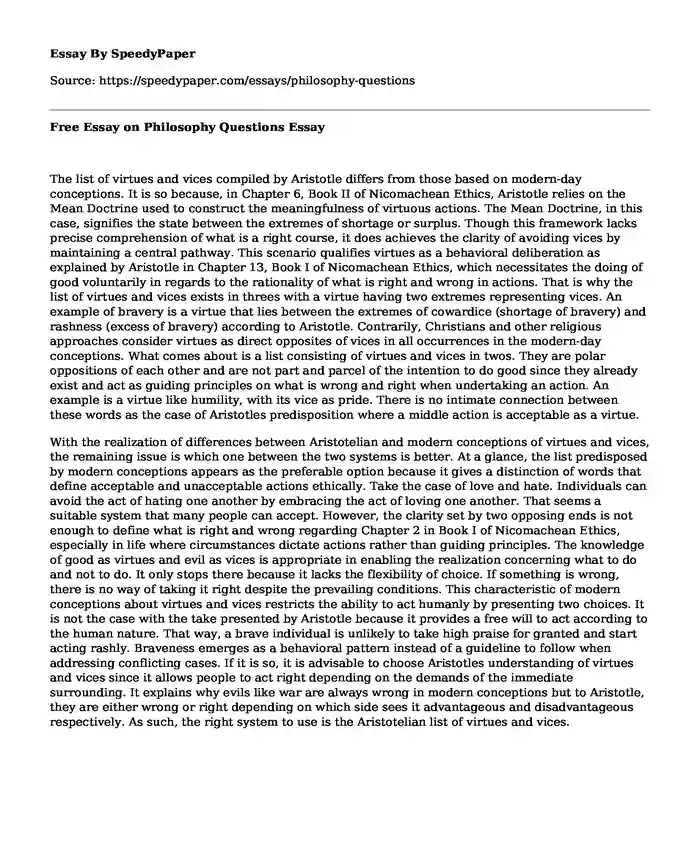
| Type of paper: | Essay |
| Categories: | Philosophy Philosophers |
| Pages: | 3 |
| Wordcount: | 601 words |
The list of virtues and vices compiled by Aristotle differs from those based on modern-day conceptions. It is so because, in Chapter 6, Book II of Nicomachean Ethics, Aristotle relies on the Mean Doctrine used to construct the meaningfulness of virtuous actions. The Mean Doctrine, in this case, signifies the state between the extremes of shortage or surplus. Though this framework lacks precise comprehension of what is a right course, it does achieves the clarity of avoiding vices by maintaining a central pathway. This scenario qualifies virtues as a behavioral deliberation as explained by Aristotle in Chapter 13, Book I of Nicomachean Ethics, which necessitates the doing of good voluntarily in regards to the rationality of what is right and wrong in actions. That is why the list of virtues and vices exists in threes with a virtue having two extremes representing vices. An example of bravery is a virtue that lies between the extremes of cowardice (shortage of bravery) and rashness (excess of bravery) according to Aristotle. Contrarily, Christians and other religious approaches consider virtues as direct opposites of vices in all occurrences in the modern-day conceptions. What comes about is a list consisting of virtues and vices in twos. They are polar oppositions of each other and are not part and parcel of the intention to do good since they already exist and act as guiding principles on what is wrong and right when undertaking an action. An example is a virtue like humility, with its vice as pride. There is no intimate connection between these words as the case of Aristotles predisposition where a middle action is acceptable as a virtue.
With the realization of differences between Aristotelian and modern conceptions of virtues and vices, the remaining issue is which one between the two systems is better. At a glance, the list predisposed by modern conceptions appears as the preferable option because it gives a distinction of words that define acceptable and unacceptable actions ethically. Take the case of love and hate. Individuals can avoid the act of hating one another by embracing the act of loving one another. That seems a suitable system that many people can accept. However, the clarity set by two opposing ends is not enough to define what is right and wrong regarding Chapter 2 in Book I of Nicomachean Ethics, especially in life where circumstances dictate actions rather than guiding principles. The knowledge of good as virtues and evil as vices is appropriate in enabling the realization concerning what to do and not to do. It only stops there because it lacks the flexibility of choice. If something is wrong, there is no way of taking it right despite the prevailing conditions. This characteristic of modern conceptions about virtues and vices restricts the ability to act humanly by presenting two choices. It is not the case with the take presented by Aristotle because it provides a free will to act according to the human nature. That way, a brave individual is unlikely to take high praise for granted and start acting rashly. Braveness emerges as a behavioral pattern instead of a guideline to follow when addressing conflicting cases. If it is so, it is advisable to choose Aristotles understanding of virtues and vices since it allows people to act right depending on the demands of the immediate surrounding. It explains why evils like war are always wrong in modern conceptions but to Aristotle, they are either wrong or right depending on which side sees it advantageous and disadvantageous respectively. As such, the right system to use is the Aristotelian list of virtues and vices.
Cite this page
Free Essay on Philosophy Questions. (2019, Nov 11). Retrieved from https://speedypaper.com/essays/philosophy-questions
Request Removal
If you are the original author of this essay and no longer wish to have it published on the SpeedyPaper website, please click below to request its removal:
- Employment Laws Essay Sample
- Essay Sample on Improving the Company's Compensation Policies
- Essay Example on Application of Systems Thinking in Human-Centered Organizations
- The Clinical Nurse Leader: Educational Preparation and Roles, Essay Sample
- The Ursuline Nuns in America, Free Essay Example
- Soundtrack Analysis of a Scene in the Film Matrix (1999). Essay Sample
- Essay Sample on Gender Gap and Compensation
Popular categories




